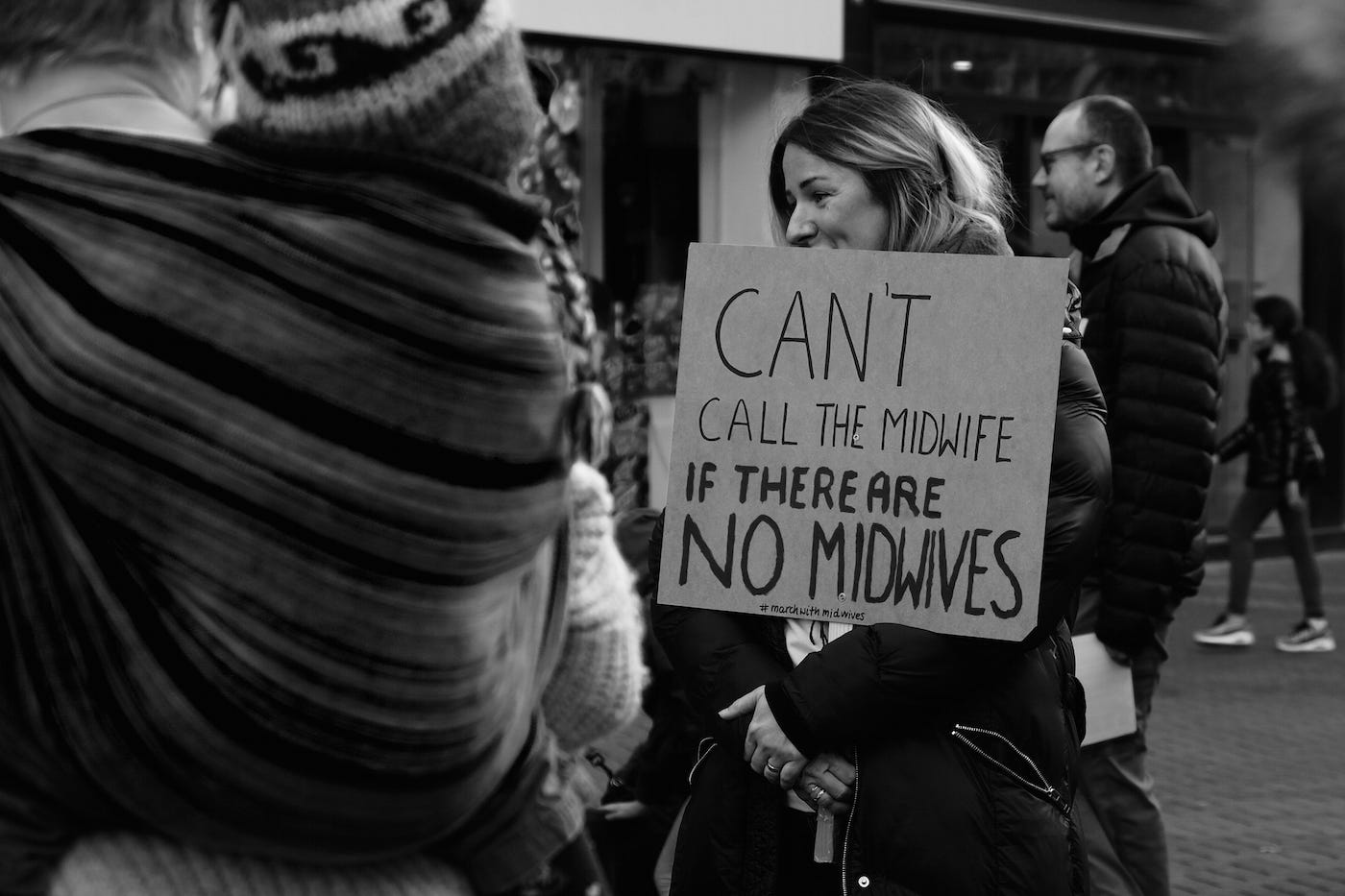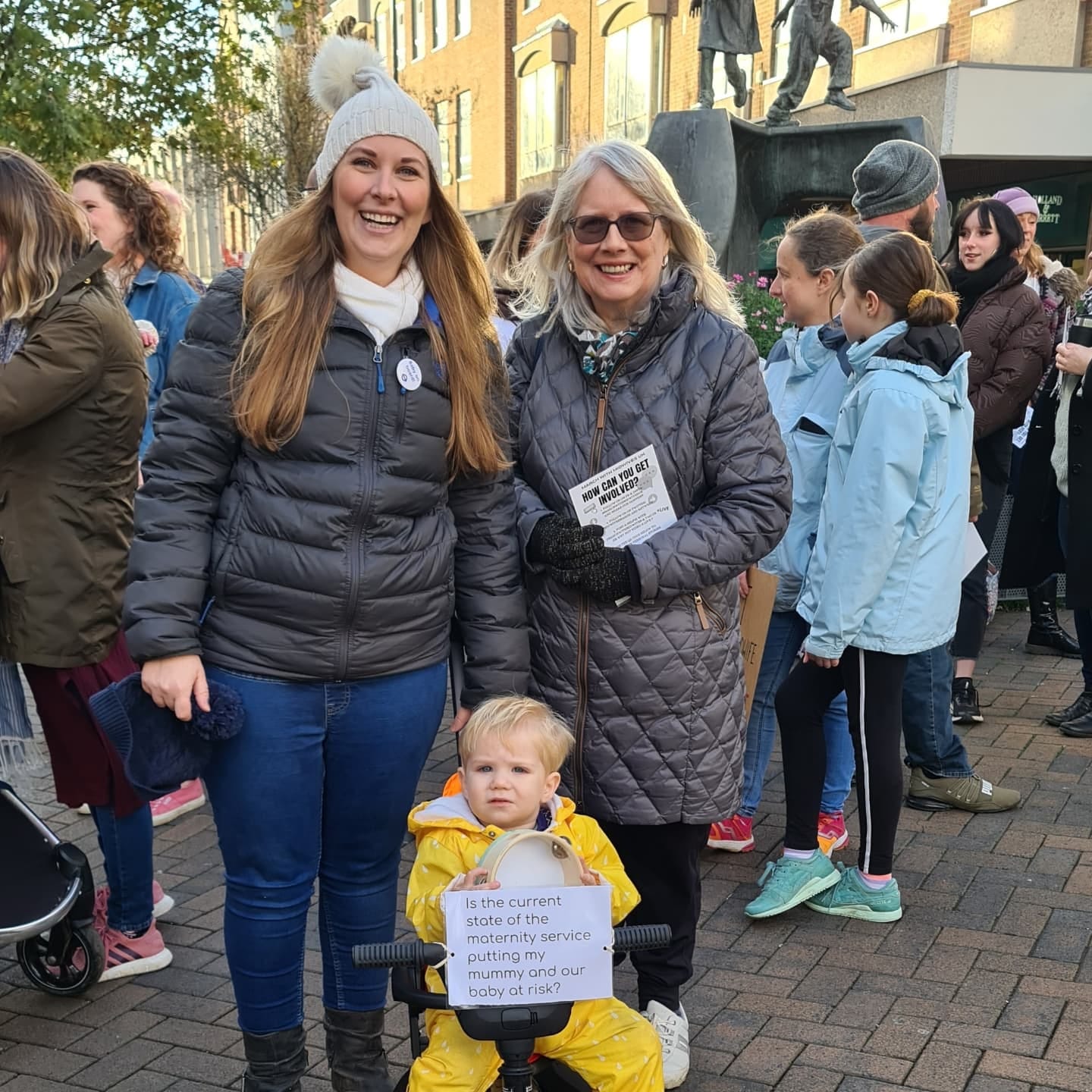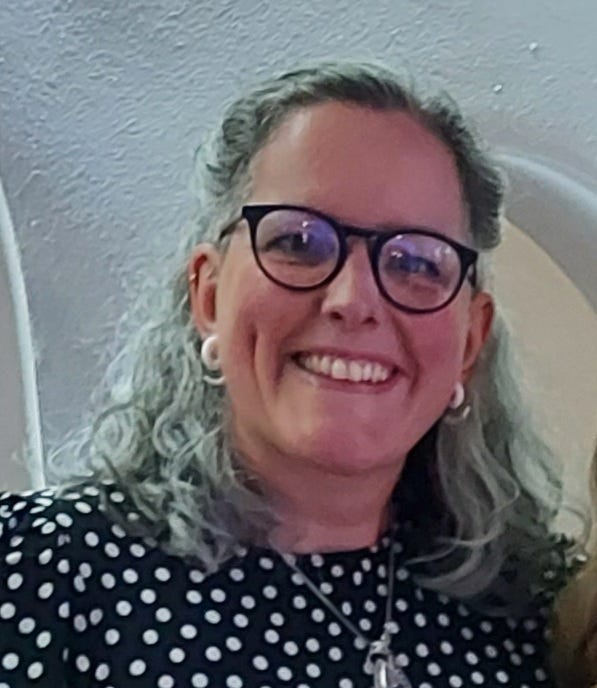Maternity services ‘unsafe’ and in crisis
Mothers and midwives have joined forces to demand a radical overhaul of maternity services as they say the current system is breaking professionals and leaving some families without the care they need
By Sarah Ward
Demonstrations took place all over the country this weekend with midwives, health professionals and parents taking to the streets with placards at 75 different vigils to make the plight of the in-crisis service known. The March With Midwives campaigners point to a recent report by Care Quality Commission inspectors which has said in 2021 maternity services have become unsafe for staff and women.
The group is now demanding the government listens to maternity staff, funds emergency retention and reduces the demand on midwives.
A large crowd took part in the Northampton event and three local women involved in the fight to get better care for both the pregnant mothers and the midwives looking after them, tell us of their experiences.
A midwife
Jaycie Wall, 36, is working her notice as a midwife at Northampton General Hospital where she has provided care to pregnant women for five years. She says she can go on no longer and needs to leave the profession for her own health.
She paints a picture of chaotic, stressful days; 12 hour shifts without proper breaks and a National Health Service at breaking point following the hammer blow from Covid-19.
“I’m already feeling anxious before my shift starts as I don’t know where I am going to be based, whether on the wards or straight into an emergency situation and if there are going to be enough staff to support me.
“There are often lots of women waiting for inductions and their families are getting frustrated. They are not always treated in the way they should be which makes us disappointed in the care which has been given.”
She said the pandemic had a huge impact on the service, which was already struggling.
“Covid has been a massive factor. We were already on our knees and when Covid came in we lost a large amount of staff who were self isolating.”
The continual testing for the virus, masks and PPE also puts a pressure on the service and has added in extra work for midwives whose raison d'etre is to care for women as they go through pregnancy.
Jaycie, who was diagnosed with Multiple Sclerosis a few years ago, is not alone in getting to the stage where she has decided the profession she once loved is no longer one she can manage. A recent survey by the Royal College of Midwives says that 60 per cent of serving midwives are considering quitting, a potential disaster, when the organisation says the profession is currently 3,500 short of where it needs to be. For every 30 midwives who qualify, 29 leave.
Jaycie is uncritical of her colleagues or the hospital’s management, who she says are trying just as hard to keep everything afloat as the midwives.
“I have decided to speak out because I have got to leave for my own health and wellbeing, but I feel bad for leaving my colleagues and so the least I can do is to use my voice.
“I don’t know what the solution is, but what I want is for the government to acknowledge there is a problem. I don’t know where the service will be in five years time if something doesn’t change. It is falling away and it is only getting by on the good will of the staff.”
A mother
Natalie Rock, of Duston, had her son Hunter, now 18 months old, during the first lockdown in June 2020.
Up until February of 2020 she said all her appointments had progressed as normal but when the lockdown came it made her extremely anxious - initial warnings about the potential effect of the virus on women in their third trimester making her husband even wary of going to the local shop to buy food for fear of bringing it into their home.
She had one of her final appointments cancelled and even had an invasive procedure at the makeshift maternity ward set up at Northampton Saints ground, in a glass windowed room on a bed without a curtain overlooking the playing pitches.
Despite this Natalie only has praise for the service she received up until her son’s birth but she is damning of the postnatal aftercare she was given at Northampton General Hospital after her son was born by urgent caesarean section.
Under the Covid rules her husband had to leave ten minutes after their son was born and then she was taken to a post recovery room where she had to wait for 11 hours until the positive results of a PCR test taken just after birth had come through before she could be moved onto a ward.
“As soon as my son was born I felt the maternity service was horrendous. Up until that point the midwives had been very accommodating and caring. But after he was born I felt as if I had minimal attention.”
“I had just had an abdominal surgery and I could not physically move my body - so it was really difficult for me to hold my baby. I kept asking ‘can someone help me’ and they kept saying they will get back to me. It was so distressing.
“No one mentioned under staffing but every single department I went into I was in earshot of staff complaining about other colleagues and about how much they had to do. “I can’t do that now, I have just had someone who has haemorrhaged.”
“There was no attentive care at all. For the first time in my life I was debilitated. I was struggling with having missed three days of sleep and having had a cocktail of medication. I wasn’t in a fit state to all of a sudden be looking after a newborn.”
Due to Covid restrictions, her husband was not allowed into the hospital during the two nights she was there and she says she was not given enough help with breastfeeding, which like many new mothers, she was struggling with.
In order to be released from the hospital she had to pass the tests of being able to pass urine without any blood and also to shower herself independently. She did this alone, with her new baby in a cot by the side of the shower.
“I didn’t feel cared for,” she says. “I felt like the midwives hated me. Obviously something was going on and they don’t have the capacity to care.
“It got to the point where I thought ‘if I hear another baby cry or hear another buzzer go I feel like I’m not going to be able to breathe’. Very shortly after that I had a panic attack. I felt like I was trapped - I felt like I was locked in.”
When she returned home with her newborn the Covid restrictions also meant she could not have any home visits and so was not given any practical help with breastfeeding.
She says the postnatal care given to women from the moment they give birth needs to change.
“It just shocks me. There is no dignity for women. It feels like the system says ‘it is child-birth - it is going to be painful, it is going to be disgusting, and be thankful that your baby was delivered’. That is not enough.”
*Northampton General Hospital was approached for a right to reply on Natalie’s experience.
A March With Midwives campaign organiser
Becki Scott, a doula from Mawlsey, is one of the group of women who coordinated the national campaign, which is now pushing the plight of mothers and midwives into the national consciousness.
A conversation on Facebook quickly turned into a national campaign and the petition at the heart of the grassroots movement has now gained over 100,000 signatures and will be presented to Downing Street next month.
As a Doula - a trained companion who helps pregnant women -and as a former maternity support team worker, Becki has had much experience of maternity services on offer to women in the current day.
“Having worked in the hospital myself, I have a lot of friends who are midwives and so I’m hearing what they are going through. A lot of them have been scared to speak up, but this campaign is starting to give them a voice.”
Becki is also aware of how the pressures within the maternity service are impacting on the birth experiences of women.
“The majority of people I work with have had a bad experience the first time round and want a better experience next time. The pandemic has made things ten times worse. It is now a full blown crisis. Especially for the midwives who have worked throughout the pandemic. They haven’t been looked after- they are just knackered and worn out.”
Government response
A Department for Health and Social Care spokesperson said:
“We are committed to patient safety, eradicating avoidable harms and making the NHS the safest place in the world to give birth.
“Midwives do an incredibly important job and we know how challenging it has been for those working during the pandemic. There are more midwives working in the NHS now than at any other time in its history and we are aiming to hire 1,200 more with a £95 million recruitment drive.
“The mental health and wellbeing of staff remains a key priority and the NHS continues to offer a broad range of support including through dedicated helplines and mental health and wellbeing hubs.”
Luke Farmer image.








Disappointing that this story , whilst covered locally was airbrushed out of the national news.